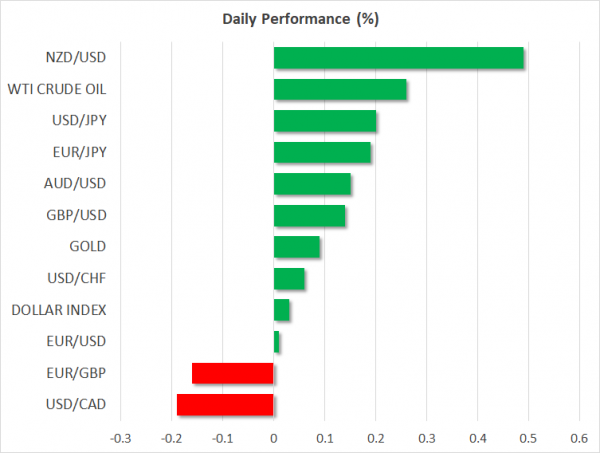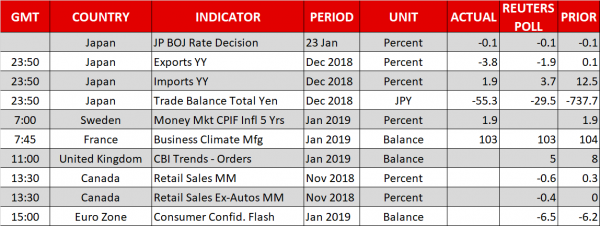- Risk appetite remains weak as trade and growth concerns resurface
- BoJ stays on hold, provides no new signals – yen yawns
- Kiwi outperforms as New Zealand’s inflation prints beat estimates
Growth and trade woes keep investors on the defensive
Market sentiment remained fragile on Tuesday, with investors cutting their exposure to riskier assets and diverting those funds into safer plays, amid resurgent worries around global growth and trade uncertainties. News that the US will proceed with the extradition of the Huawei executive arrested in Canada turned sentiment sour early on, and subsequent reports that the US rejected holding preparatory talks ahead of next week’s high-level trade negotiations amplified worries further. The data flow wasn’t any better, as both Germany’s ZEW survey and US existing home sales fell short of expectations, feeding the narrative of a global slowdown.
Accordingly, US stock markets felt the burn, with the S&P 500 and the Dow Jones falling by 1.42% and 1.22% respectively on their first day back from a public holiday. Crucially though, both of these indices found support near their 50-day moving averages and rebounded, which keeps the short-term technical picture neutral for now. In the FX space, the defensive Japanese yen outperformed most of its major peers, while commodity currencies such as the aussie and the loonie surrendered ground, in tandem with oil prices.
Looking ahead, the meeting next week between US Secretary Mnuchin, Trade Representative Lighthizer, and China’s Vice Premier Liu He will be critical for risk sentiment. Recent reports suggest the US is dissatisfied with the lack of progress on key issues such as forced technology transfer. To the extent that is accurate, it will be interesting to see whether the Trump administration is “in it for the long haul”, in the sense of being willing to hold out for major concessions on the key subjects, or whether it will settle for a short-term solution that merely boosts markets.
BoJ: Don’t stay up waiting for normalization
Overnight, the Bank of Japan (BoJ) kept both its massive stimulus program and forward guidance unchanged, as was widely expected. The Bank did revise down its inflation forecasts, but that was hardly surprising either considering that price pressures remain muted. Overall, there was no sign that policymakers are contemplating removing any stimulus in the foreseeable future, considering the recent streak of soft data and external trade risks. Given the absence of any new signals, there was no major reaction in the yen on the news, though the currency is broadly on the back foot today. Other things equal, the BoJ’s ultra-loose stance argues for a weaker yen over time from a yield-differential perspective, though admittedly, the currency’s actual direction will depend primarily on how risk sentiment evolves, given its safe-haven status.
Kiwi cheers as inflation beats forecasts
The kiwi is the best performer among major currencies today, gaining roughly 0.5% against the dollar thanks to stronger-than-expected quarterly CPI figures out of New Zealand overnight. The headline CPI for the fourth quarter clocked in at 1.9% in yearly terms, staying unchanged from previously and beating the forecast for a downtick to 1.8%. Consequently, the news may have reassured investors that the economy is still strong enough to keep inflationary pressures up, thereby reducing the chances for a potential rate cut by the Reserve Bank of New Zealand later this year. That said, given the growth slowdown in the third quarter and the mounting downside risks from the US-Sino trade war, the RBNZ is unlikely to abandon its neutral-to-cautious policy stance anytime soon either.


